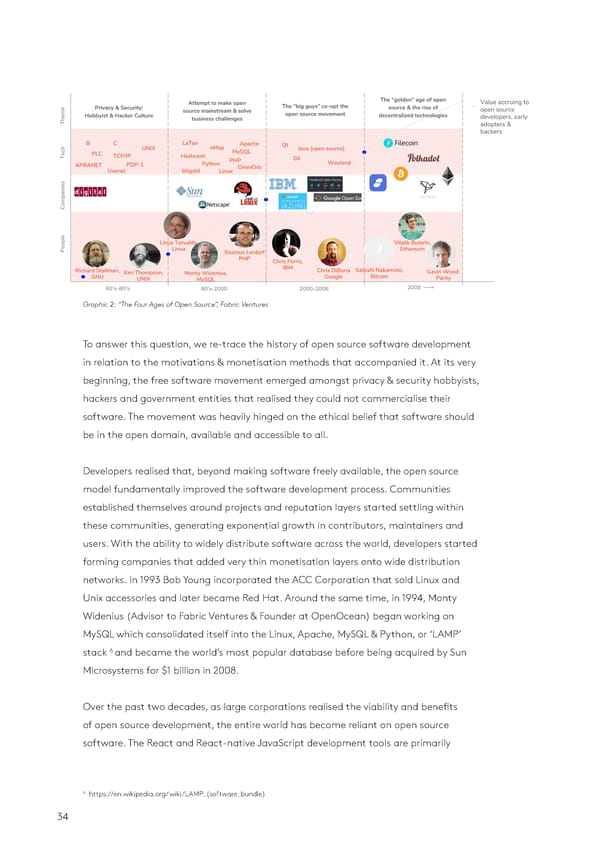maintained by Facebook while Google has made countless contributions to Android, Kubernetes and Go amongst others. Microsoft, which would have been considered as the primary opponent of open source less than 20 years ago, has reinvented itself into the company supporting the largest number of open source developers in 2017 and recently acquired Github for $7.5b. The tech giants have co-opted open source software, have mostly stopped charging for software, and have built their entire business around monetising their users’ data instead: creating trillions of dollars of market cap by using software that they don’t own, and data that isn’t theirs. Unfortunately, in this third wave of open source software development, the developers have lost the ethical aspirations and romantic motivations that drove the first wave, often without benefiting from the financial upside or the reputational rewards that drove the second wave. Graphic 2: “The Four Ages of Open Source”, Fabric Ventures With Satoshi Nakamoto’s 2008 release of the Bitcoin whitepaper, we’ve entered To answer this question, we re-trace the history of open source software development into the fourth age of open source software development: by solving the ‘double in relation to the motivations & monetisation methods that accompanied it. At its very spend’ problem and creating ‘digital scarcity’ in decentralised systems, Satoshi lay beginning, the free software movement emerged amongst privacy & security hobbyists, the foundation enabling the integration of a digital value transfer layer within peer hackers and government entities that realised they could not commercialise their to peer networks. This fundamental architecture breakthrough enables open source software. The movement was heavily hinged on the ethical belief that software should networks to reward and incentivise contributors without a central authority or be in the open domain, available and accessible to all. sponsor. The permissionless innovation on open platforms and ‘trustless’ peer to peer networks combined with token-driven incentive and governance systems has started Developers realised that, beyond making software freely available, the open source a Cambrian explosion of developers and ecosystems uniting around open source model fundamentally improved the software development process. Communities projects. We believe that the open source development movement has finally found established themselves around projects and reputation layers started settling within its elusive ‘business model’ - a model which doesn’t necessarily reward a single these communities, generating exponential growth in contributors, maintainers and central entity, but instead fairly incentivises all contributors and participants, creating users. With the ability to widely distribute software across the world, developers started a distributed digital economy within each network. forming companies that added very thin monetisation layers onto wide distribution networks. In 1993 Bob Young incorporated the ACC Corporation that sold Linux and A paradigm shift driven by 3 mega trends Unix accessories and later became Red Hat. Around the same time, in 1994, Monty The success of the Web 2.0 Era over the past two decades has largely been Widenius (Advisor to Fabric Ventures & Founder at OpenOcean) began working on dominated by three fundamental technologies: Cloud, Social & Mobile. We’re MySQL which consolidated itself into the Linux, Apache, MySQL & Python, or ‘LAMP’ convinced that the coming decades of technical innovation will be driven by the 6 interplay between Edge Computing, Machine Learning and Decentralised Data: stack and became the world’s most popular database before being acquired by Sun Microsystems for $1 billion in 2008. the edge computing on swarms of devices capturing millions of data points, the advancements in machine learning algorithms ingesting this wealth of data & Over the past two decades, as large corporations realised the viability and benefits a substrate of decentralised data enabling secure & scalable communication, of open source development, the entire world has become reliant on open source coordination and fair incentivisation. software. The React and React-native JavaScript development tools are primarily 6 https://en.wikipedia.org/wiki/LAMP_(software_bundle) 34 35
 State of the Token Market Page 33 Page 35
State of the Token Market Page 33 Page 35